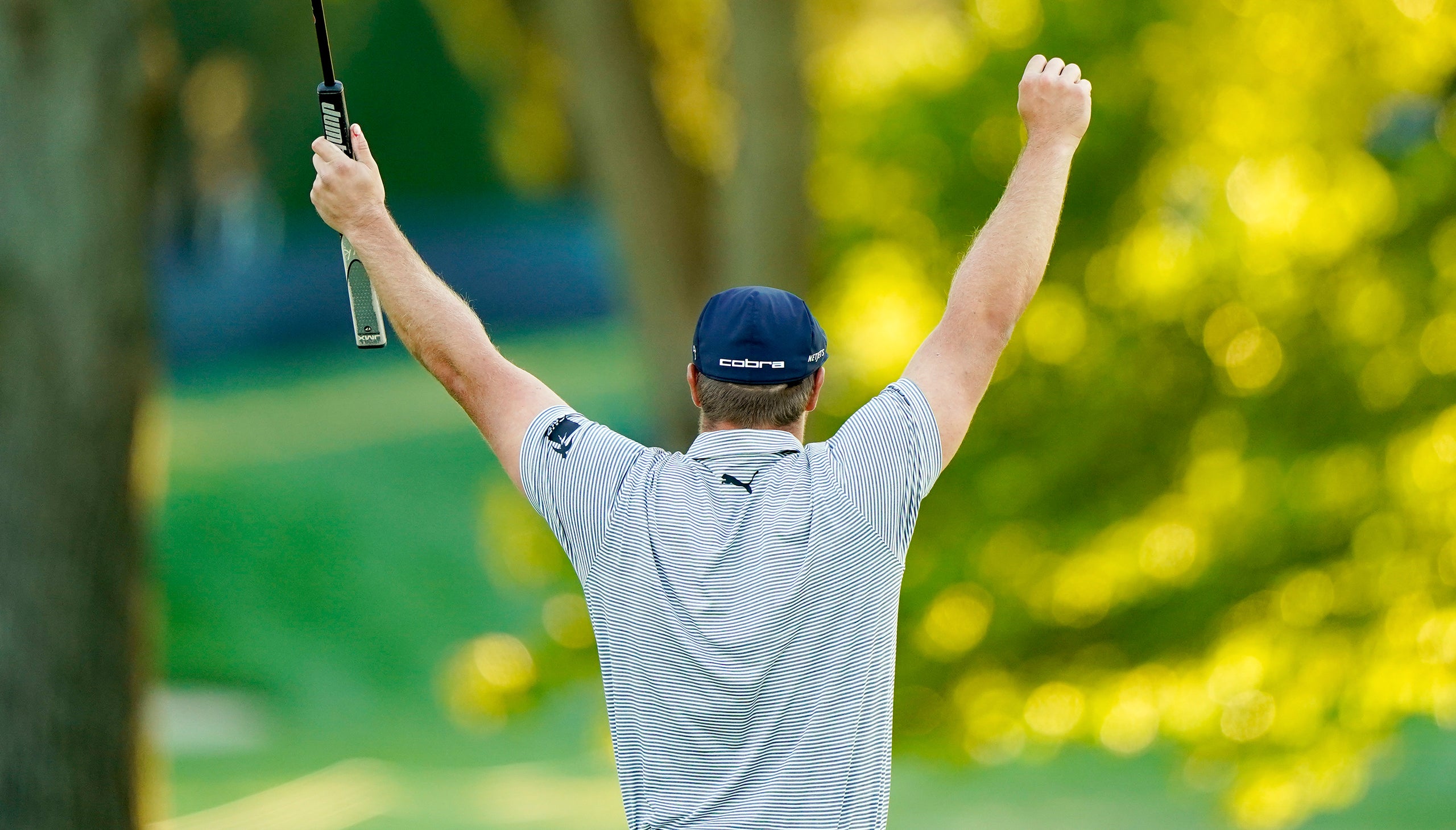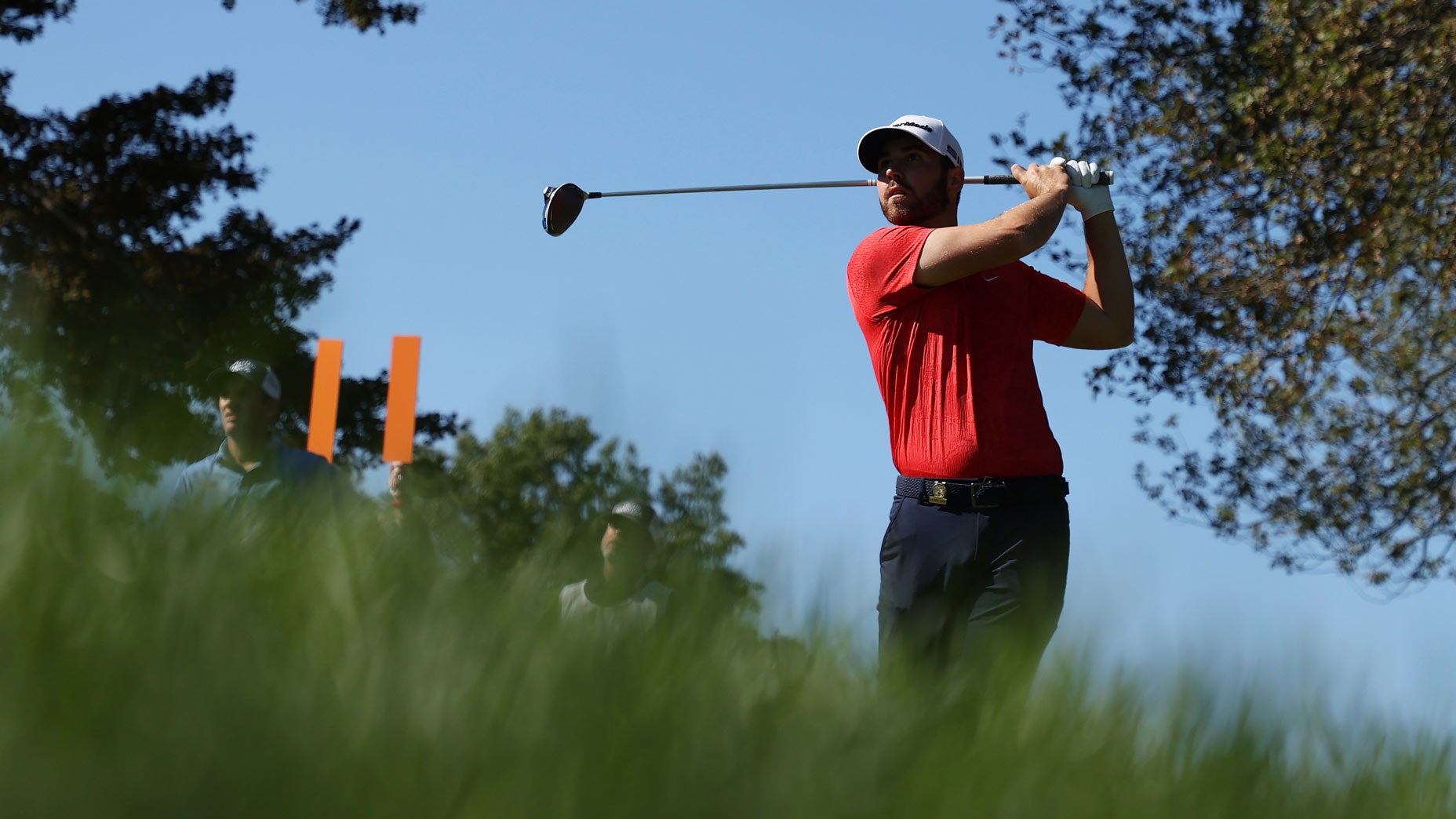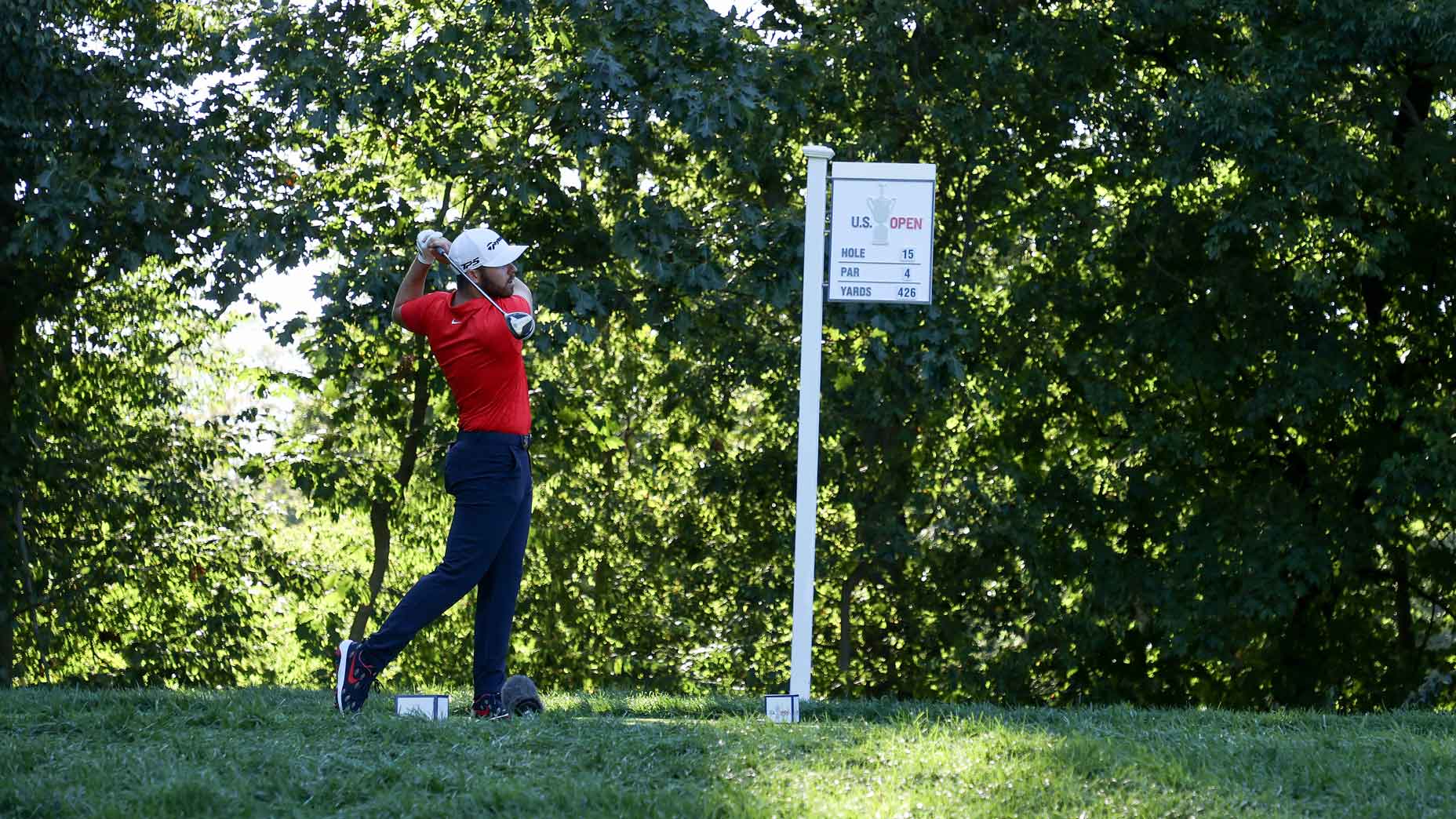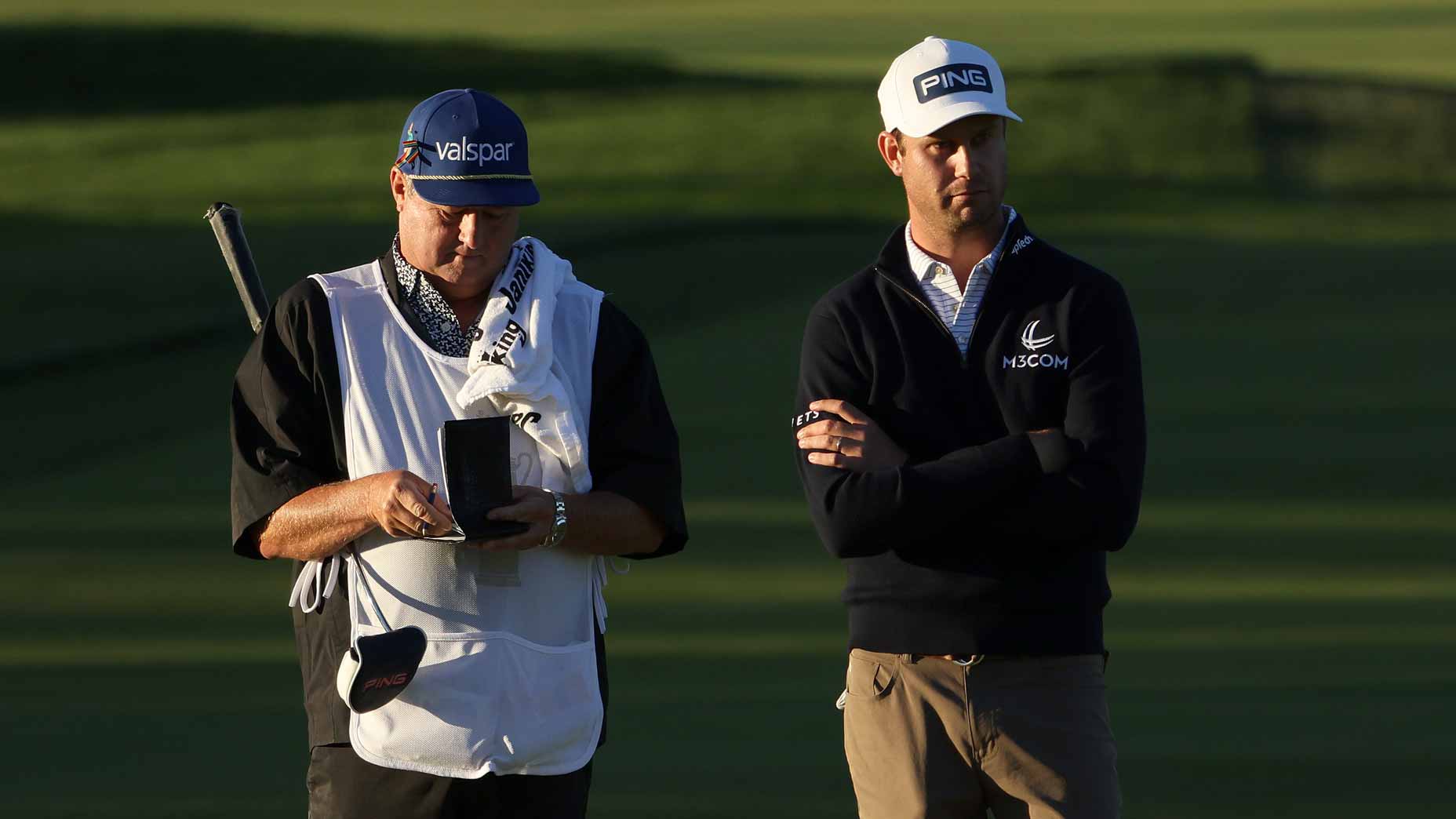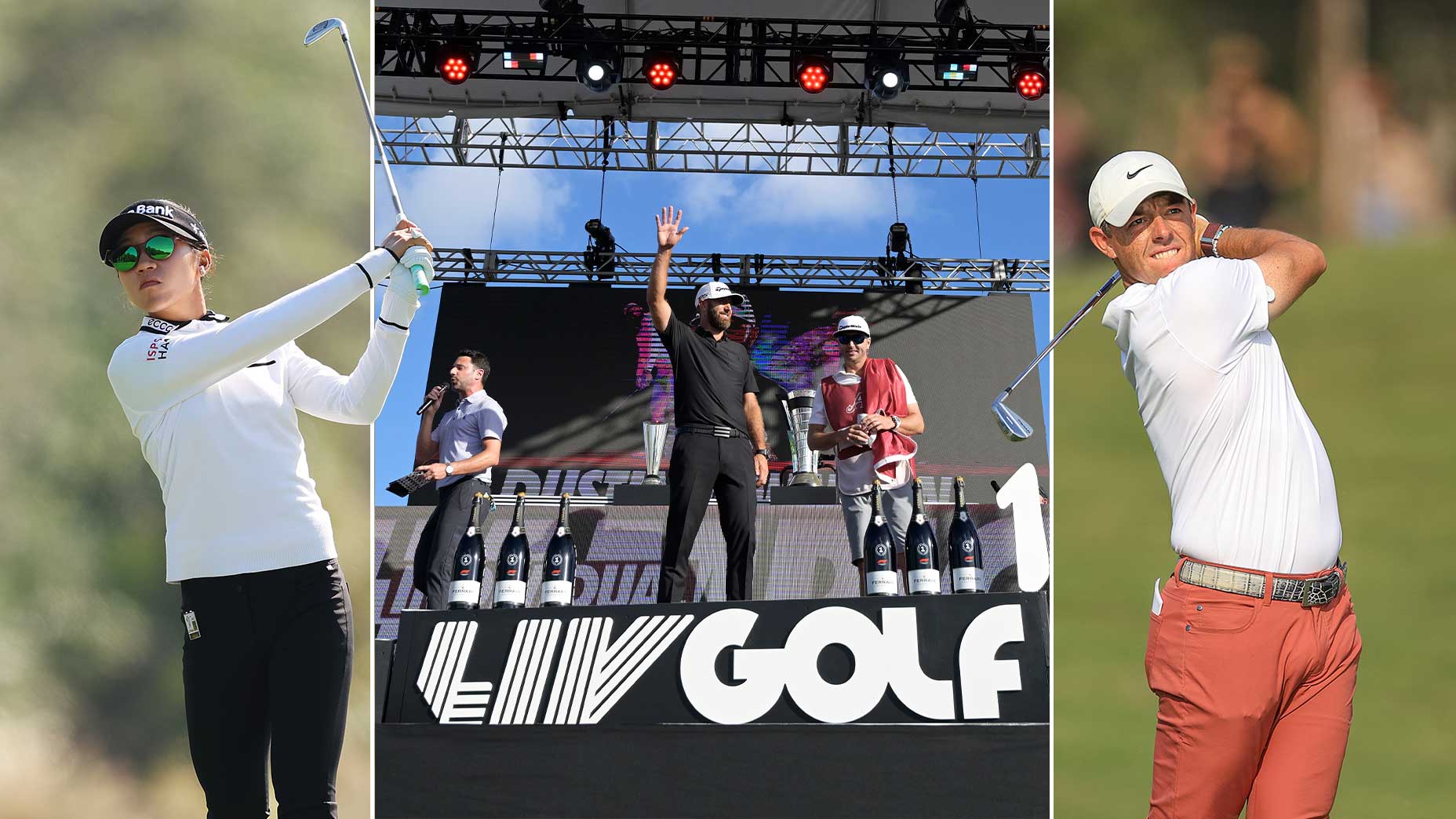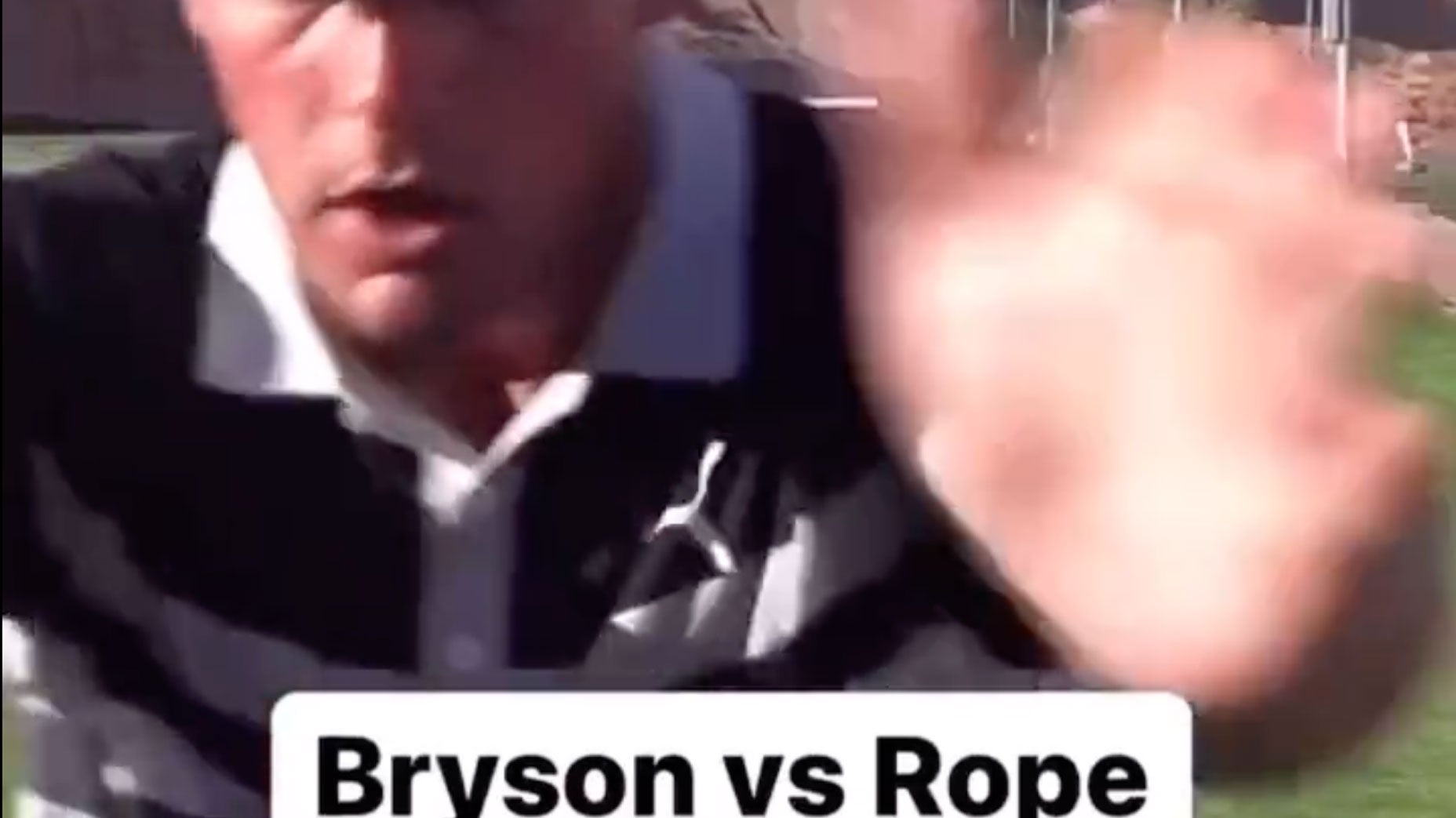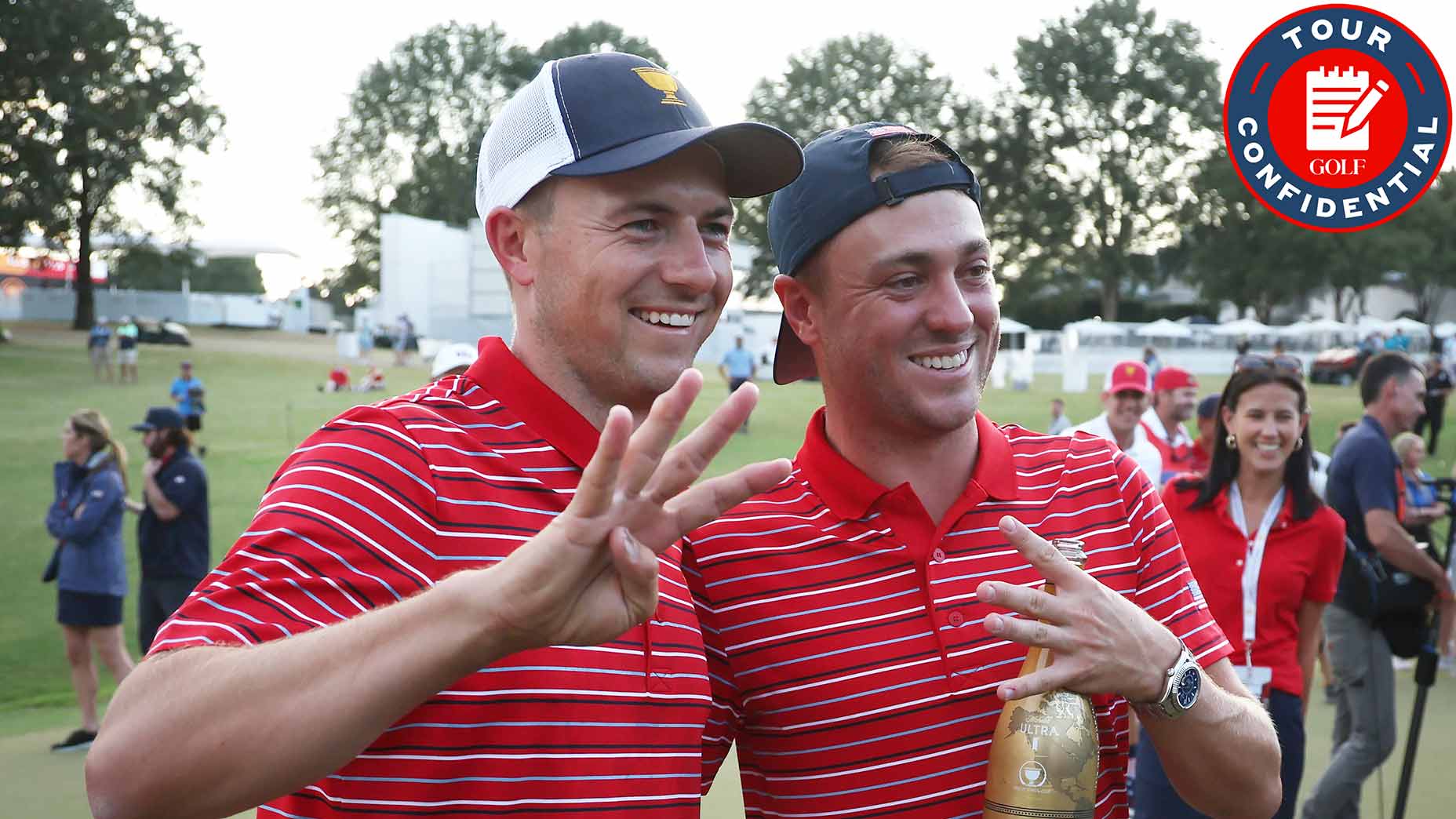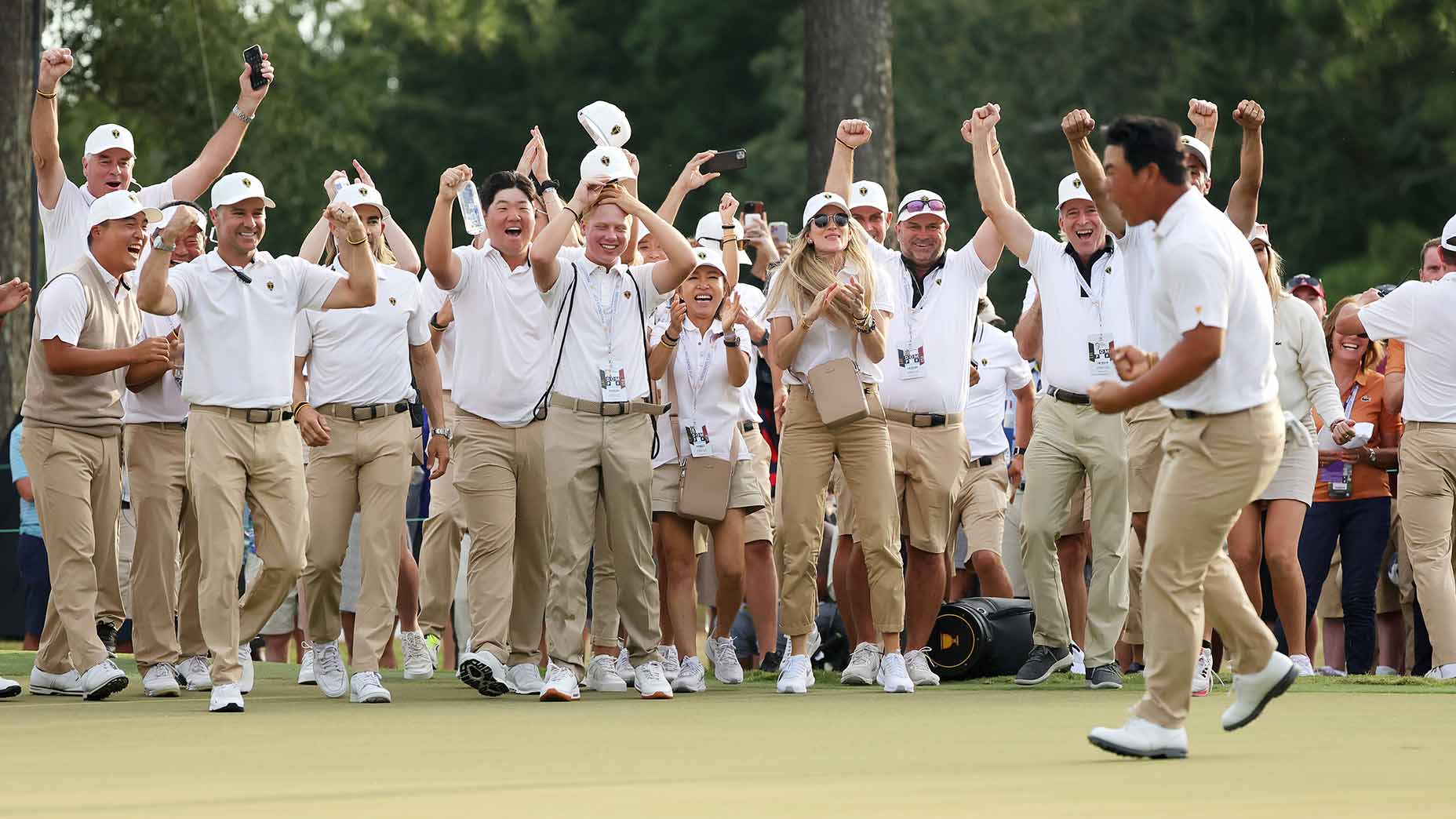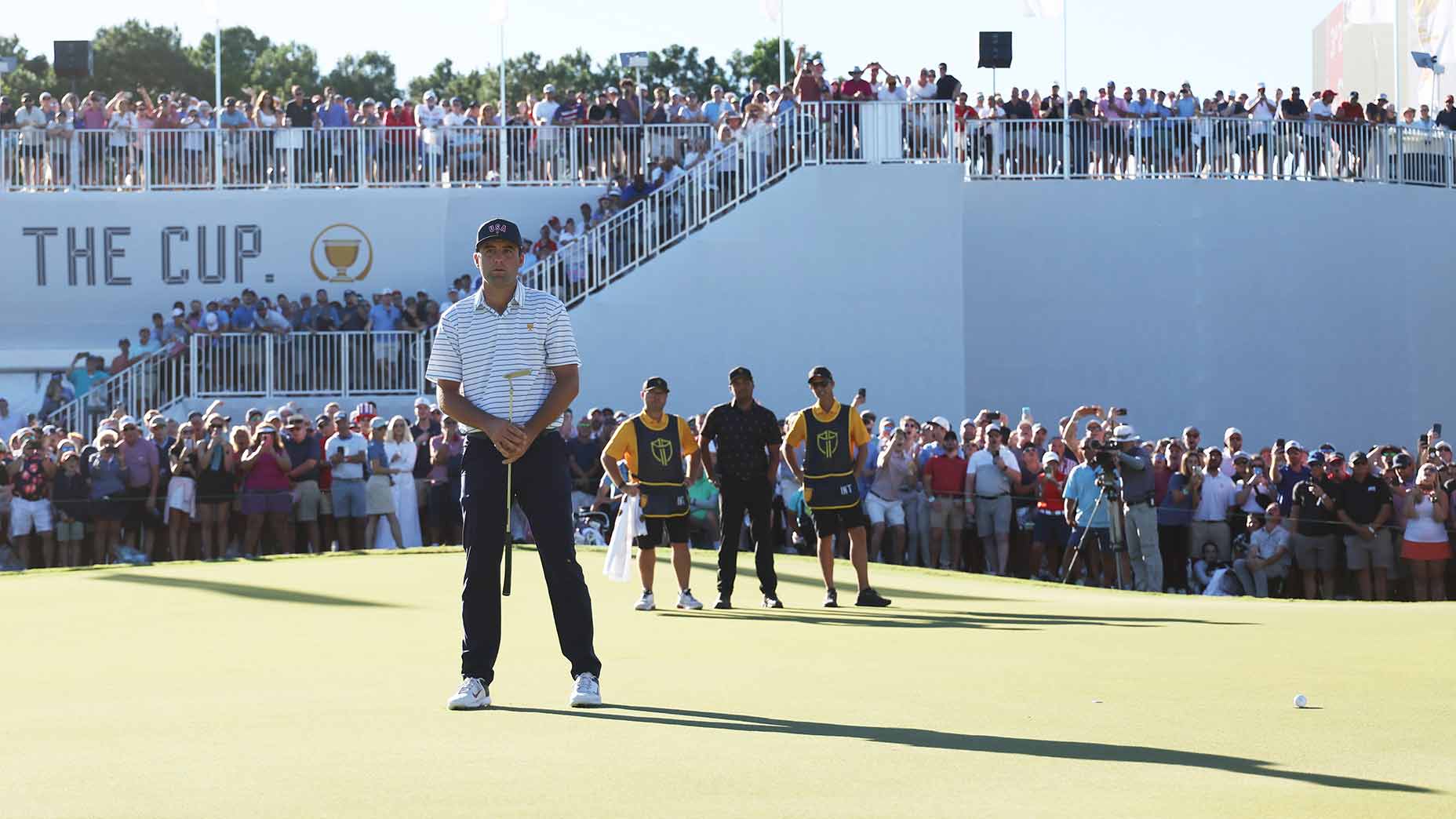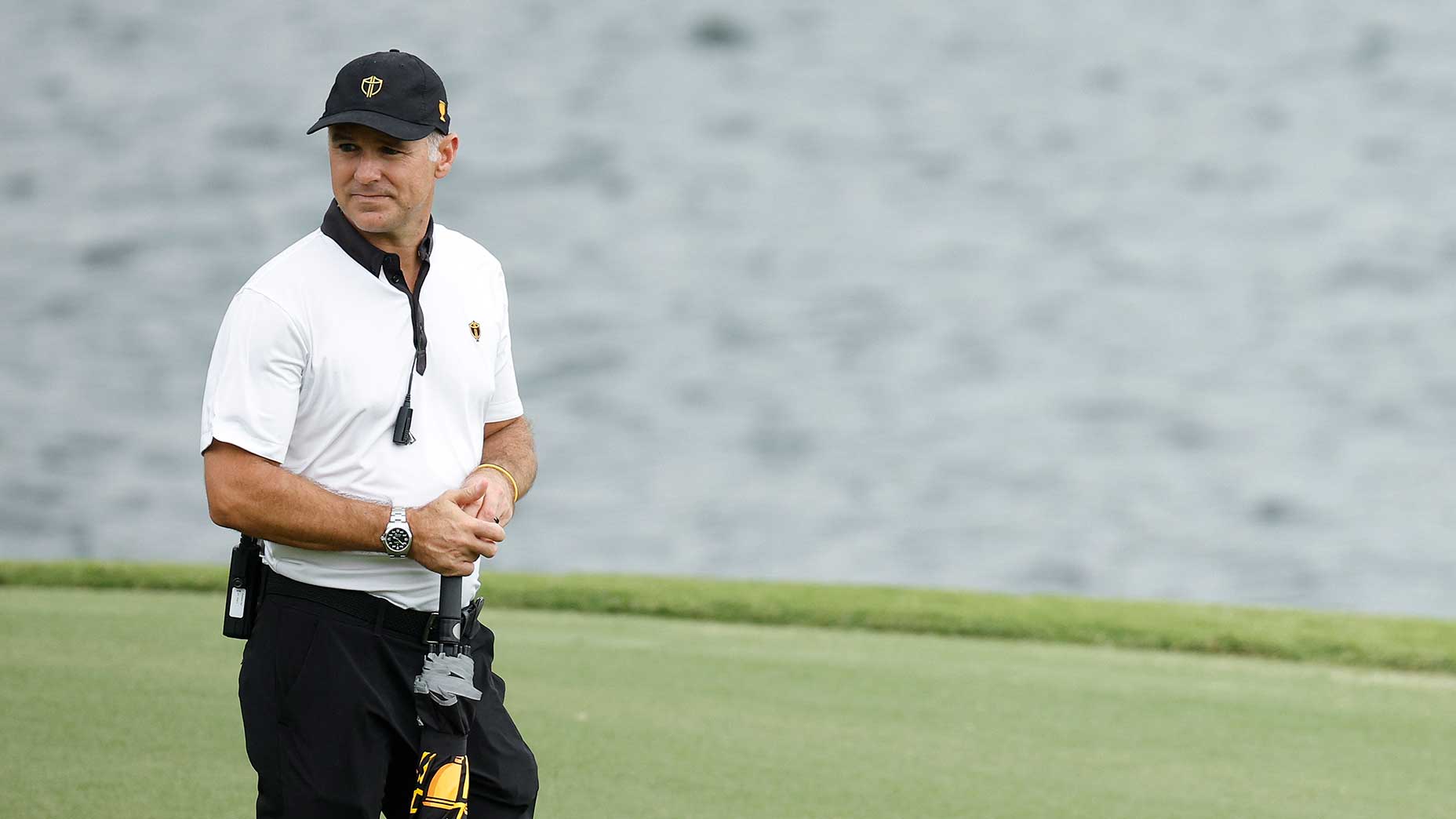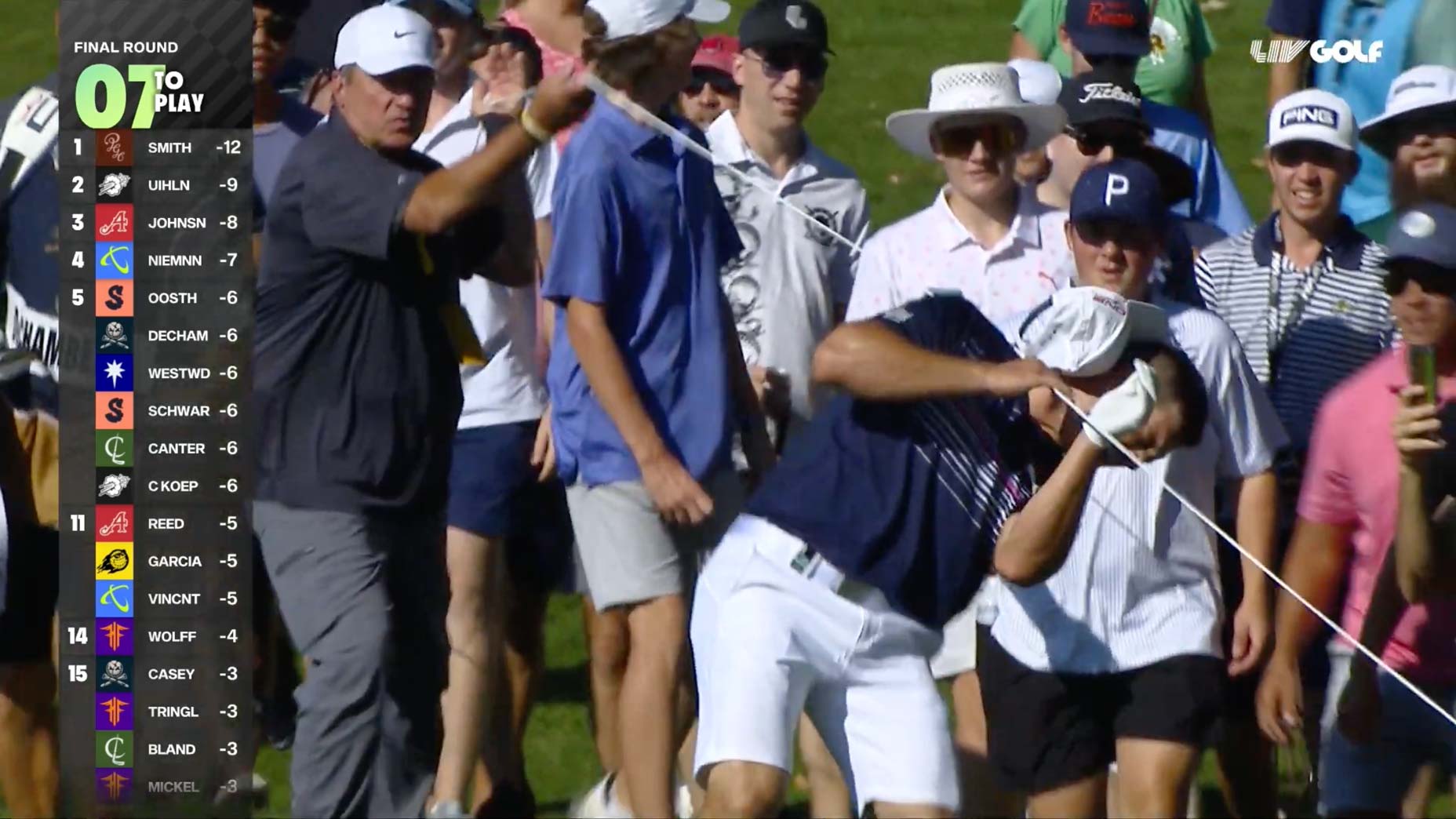Tour Confidential: DeChambeau’s breakthrough major title, what it means and what’s next
- Share on Facebook
- Share on Twitter
- Share by Email
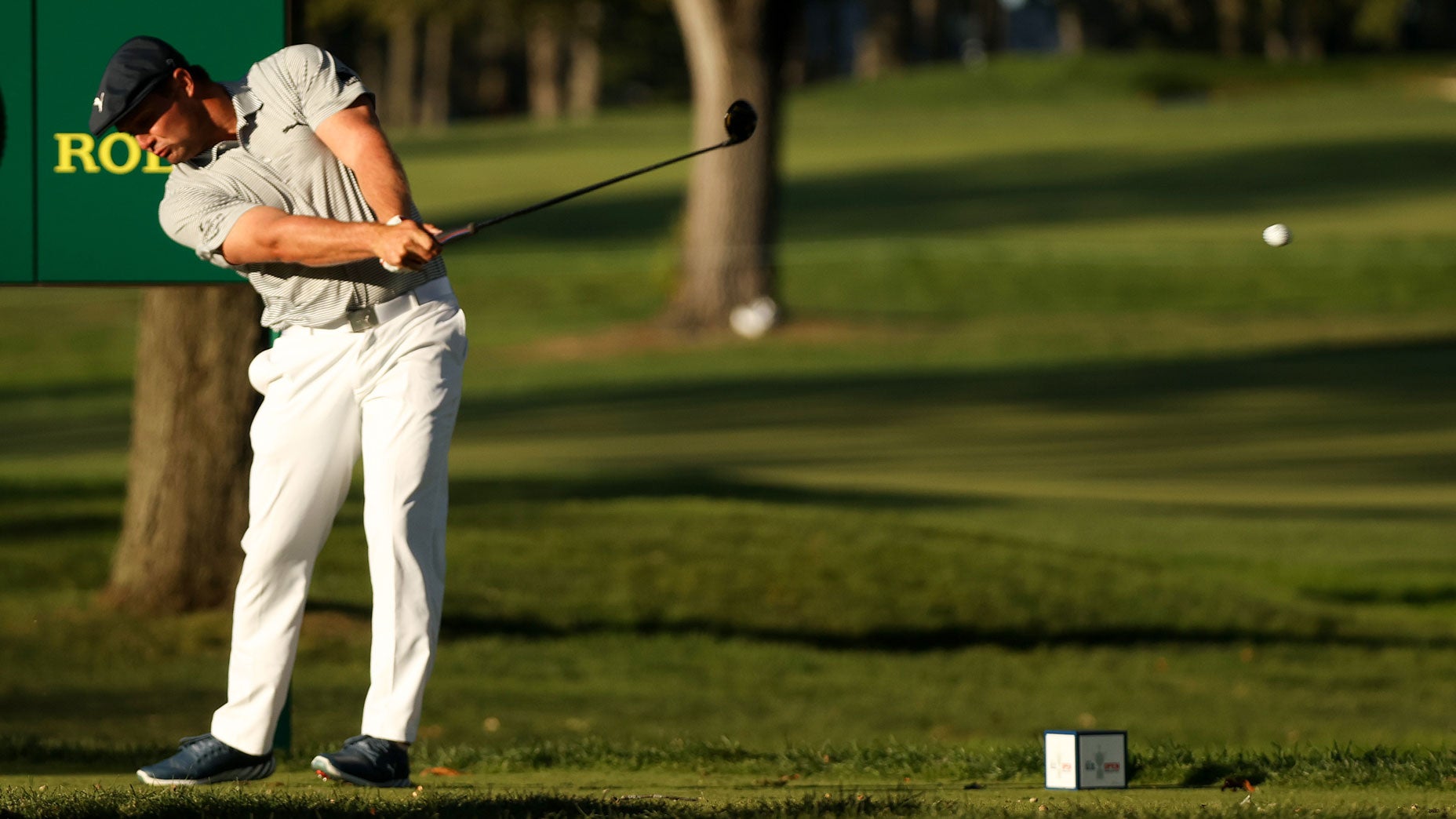
Bryson DeChambeau hits his drive on the 18th hole at Winged Foot Golf Club on Sunday.
Getty Images
Check in every week for the unfiltered opinions of our writers and editors as they break down the hottest topics in the sport, and join the conversation by tweeting us @golf_com. This week we discuss Bryson DeChambeau’s victory at the U.S. Open, whether he’s the favorite at the November Masters and more.
1. Bryson DeChambeau overpowered Winged Foot on Sunday and won the U.S. Open for his first career major victory. DeChambeau started the final round two back of Matthew Wolff but shot 67 and to finish six under overall — he was the only player under par for the week — and six better than Wolff, the runner-up. DeChambeau’s booming tee shots usually steal the headlines, but which part of his game — or game plan — most impressed you this week?
Victory & Validation: Bryson DeChambeau won the U.S. Open on his own termsBy: Michael Bamberger
Sean Zak, senior editor (@sean_zak): Man, you could list so many things. No double bogeys. Worst 9-hole score was 36. But really what impressed me was that he raised the two aspects of his game that have been struggling. He was literally more efficient with his irons and his short game than he was with his driver and putter. Strokes gained backs it up. The driver and putter seem like they’ll be there forever, but look out when the other aspects rise, like they did this week.
Alan Bastable, executive editor (@alan_bastable): Full disclosure: I didn’t think he could do it. Not at a U.S. Open. I just kept waiting and waiting for an O.B. tee shot or a three-putt double to trip him up, to rattle him. But it never came. The only real sign of angst I noted was on the 9th green on Saturday when he appeared to chide his caddie for a poor read. So that’s what most impressed me: his even-keeled, dare I say, sanguine demeanor.
Josh Sens, senior writer (@JoshSens): I was among the doubters, too. Mostly because I thought there was no way he could play efficiently from the rough all week, no matter how far he blasted it off the tee. That’s what blew me away. The distance control and accuracy he had from ankle-deep rough. He made bombing and gouging his way around a brutally hard course look ridiculously easy.
Jessica Marksbury, multimedia editor (@Jess_Marksbury): His putting! Seemed like he couldn’t miss on Sunday, the most important round of the week. Once he drained that putt from the fringe, it really felt like his day.
Michael Bamberger, senior writer: Prior to this week, I thought he was a contrarian without a cause. Now I know better.
Alan Shipnuck, senior writer (@alanshipnuck): His wedge play! That’s been a bugaboo for over a year, but he hit so many good full-swing wedges, including a bunch out of the rough to set up scoring chances. If that part of his game remains dialed in, look out!
2. We’ve discussed DeChambeau’s beef-up-and-bash-it approach in this space before, but now that he’s a major champion, it merits more analysis. Could most elite players, if they chose to, follow Bryson’s path, or is he uniquely suited — both mentally and physically — to this style of play?
Zak: I think most elite players are different than Bryson. They’re more focused on the status quo being high and keeping it steady. If the status quo isn’t winning tournaments for Bryson, he’s going to change it. See: side-saddle putting, single-length irons, etc. He simply chases every damn area of potential advantage, trying to be “the casino.” The chase is impressive and might break someone like, say, Rory McIlroy, the man with the perfect swing.
Bastable: No, no, no. If the “formula” was easily replicable, others would already have done it — not just after Bryson’s successes but before them, too. You think Charles Howell III could consume 6,000 calories a day or put on 40 pounds of mostly muscle? Unlikely. And then consider all the guys and gals on the World Long Drive Tour. They can blow it by Bryson and every other player on Tour, so why aren’t they thriving on the PGA Tour? Because they can’t putt and chip. This notion that Bryson is “taking advantage” of the game is laughable. He’s just outworking everyone else.
Sens: Bastable says it well. It’s not for everyone. But now that DeChambeau has proved his formula in a major, I’m sure we’ll be seeing copycats. Bryson’s “beef it up and bash it” approach was bold and innovative, no doubt. But there’s nothing mystical about it. Plenty of other players will be able to try it without too much trouble. How well it will work for them is another matter.
Bamberger: Collin Morikawa couldn’t put on that weight if he wanted to, and he wouldn’t want to. Absolutely not.
Marksbury: Agree with the sentiments above. Bryson seems wholly focused on maximizing the potential of whatever advantage it is that he’s looking to capitalize on at a given moment. It’s hard to imagine any of his peers replicating his success, but if I was a junior, or high school or even college golfer with professional aspirations, he would certainly be a tantalizing example of what could be.
Shipnuck: A very underrated aspect of Bryson is his willingness to risk ridicule. His DGAF attitude is aspirational. Most of us, including Tour pros, stay safely in our comfort zones. Bryson is constantly breaking free of that, and it allows him to exploit advantages others are afraid to even contemplate.
3. DeChambeau and Wolff missed many fairways — usually a no-no in U.S. Opens — but drove the ball so far that they still had short irons into most greens. “This tournament used to be about hitting fairways and greens,” Lee Westwood tweeted after the third round. On Sunday night, DeChambeau said: “They made the fairways too small this week for the guys that were really hitting the fairway. If it’s too narrow, length is gonna win. Too wide, length is gonna win.” What did this Open teach us about how best to set up a modern major venue to test the world’s best players?
Matthew Wolff is showing us something strange about fairwaysBy: Dylan Dethier
Zak: This Open taught us that 5-inch grass isn’t long. Seven or 8-inch fescue is the new definition of “long.” If you think that’s a slippery slope, that’s because it is. Also, the width of the fairways doesn’t really matter. And that the greens need to be the firmest surface on the property, cart paths included.
Bastable: Yeah, fairways and rough length don’t seem to matter anymore. I mean, they matter to some — Shane Lowry said he couldn’t get the ball to the green from the rough and was gobsmacked by how easily DeChambeau and Wolff could — but not to the bombers. Crusty, fire-breathing greens are seemingly the last line of defense.
Sens: There’s some truth in all of the above, but it’s not as if Winged Foot was a cakewalk. DeChambeau just made it look that way. The rough this week was still gnarly enough to thwart most of the field. The setup favored bombers, true. But Webb Simpson and Zach Johnson finished T8, and they’re not exactly big hitters by Tour standards. Maybe this event proves we need new ways to defend U.S. Open venues. But are there really any new ways we’re not already familiar with? No. Maybe we just need to ask Bryson to go easy on everyone next time.
Bamberger: It showed us again what Nicklaus has been saying for 40 years: if the ball goes too far – yes, in combination with other factors – traditional great courses are obsolete, in terms of traditional golfing values. This game requires less finesse and is less interesting. But that’s an opinion.
Marksbury: The hand-wringing over setups has grown tiresome for me, especially when it comes to criticism of the U.S. Open. You still have to putt and chip well to win, even when you bomb it like Bryson. He played superb golf. The past two major championship leaderboards have been super satisfying. What more do we want?
Shipnuck: The U.S. Open setup as we knew it is now dead. Long grass surrounding narrow fairways just puts everyone in the rough, giving the bombers a huge advantage. Bigger, deeper, more plentiful fairway bunkers can help, along with shaved green surrounds that demand more skill and creativity in the short game than hack-out rough.
4. Let’s park DeChambeau (for the moment!). What was your biggest non-Bryson takeaway from this September major?
Is Matthew Wolff being helped by a lack of fans at the U.S. Open?By: Nick Piastowski
Zak: That Matthew Wolff’s peak is pretty damn high. You never know just how high these guys can go. Some didn’t think Bryson could win a major! Well, Wolff seems to be of the major variety. He seems to be Rory-esque, in that he can get extremely hot and use that momentum to his advantage. I can’t wait until he does it at a course with fans.
Bastable: The fanlessnes really struck me. The PGA Championship, of course, also played out sans spectators, but there was something about a New York sporting event without roars that left me feeling a bit blue. I also think it was a big advantage for the Matt Wolffs of the field with little major experience. With the atmosphere more akin to a U.S. Mid-Am than a U.S. Open, guys could go about their business in relative calm. That was big for the young’uns.
Bamberger: Well said, Alan. Golf in September is sober to begin with, the weak light, the hint of the off-season. A U.S. Open without fans and the tension they bring just felt . . . off. But the U.S. Open deserves enormous credit for getting the event on safely, and for presenting a challenging, spectacular course.
Sens: I was surprised at the way Reed imploded on Saturday. The Sunday red he favors has always seemed fitting, because the guy has proven himself to be so clutch. Once he grabbed the lead, I figured he’d go full pitbull and hold tight to it to the bitter end.
Marksbury: As a former transplant Long Islander for nearly a decade, I’ve always thought September was the finest month of the year in N.Y. — cool with blessedly low humidity — and having the opportunity to see a U.S. Open played at such a storied venue in what Michael perfectly described as “weak light” was a real treat. The course looked immaculate, and sweater golf truly is the most wonderful temperature to play.
Shipnuck: Reed was my answer, too. Or Justin Thomas. Or Rory McIlroy. Or Jon Rahm. A lot of great players looked overmatched, which throws into sharp relief how dominant DeChambeau was.
5. The 2020 Masters is the next major up. Based on what you saw from DeChambeau at Winged Foot, any reason to believe he won’t dismantle Augusta National in a similar fashion? And is he the clear favorite at this moment?
Zak: I don’t mean to brag, but I’ve been flying the DeChambeau flag alongside my colleague Luke Kerr-Dineen for months now. And we’ve always agreed that, while it might not happen right away, it’s going to happen at Augusta. If his short game and distance control are as good that week as they were this week, he’ll win by four. (To answer the second question, it doesn’t necessarily make him the favorite. I’d still lean toward DJ, who back-doored into a T6 finish today.)
Bastable: Favorite? Sure, I guess. But I also thought Patrick Reed was the guy to beat this week. I just want to see Bryson drive the green at 13 before they push the tee back.
Sens: He’s among the favorites, for sure. But we’ve seen this script before. A player puts on a dominant display of golf, and we pencil him in for the Grand Slam. He’s not going to leave the entire field behind him with his length at Augusta. Plenty of guys are long enough to cut that course down to size. He’s still going to have to putt and leave his approaches in all the right places.
Bamberger: A fast Augusta National might give headaches to Bryson through which he cannot play.
Marksbury: I agree with Josh. Is he a favorite? Yeah. But there are probably 10 guys who, regardless of form heading into Masters week, just seem to always play well there. It will be really tough to choose a winner in November.
Shipnuck: Clear favorite, for sure, but chipping and putting there is the ultimate test. If Bryson solves Augusta National, look out!
6. Harris English, five off the lead after 54 holes, started his final round in brutally tough fashion: sending his opening tee shot into the left rough, where it was never recovered. Can you recall a more consequential first swing in the final round of a major?
U.S. Open contender Harris English loses ball in rough on 1st hole, makes costly double bogeyBy: Kevin Cunningham
Zak: Paul Dunne’s first swing at the Old Course on Sunday at the 2015 Open Championship will probably go down as one of the most predictable horrible shots in golf history. Poor guy was an amateur in the solo lead at the Home of Golf. I don’t think you can find a more nervy circumstance!
Bastable: It wasn’t a first swing, but it was on the 1st hole — at the 2001 Open Championship — when Ian Woosnam’s caddie realized he had mistakenly slipped a second driver into his man’s bag. “You’re going to go ballistic,” the looper said to Woosie, who at that point was one off the lead. The infraction cost Woosnam two shots. He eventually finished four back of David Duval.
Sens: Rory’s opening tee shot on Sunday at Augusta in 2018 didn’t turn out to be consequential (he made a Houdini par), but it was telling. The wildness of the shot – blocked right of right of right – was a reminder of the extent to which Augusta seems to have gotten in his head.
Bamberger: Tiger, first shot, 2003 Open, Sandwich. Lost ball. Never recovered.
Marksbury: I second that, Michael! Hard to come up with a bigger dagger to the heart than a start like that from the Big Cat.
Shipnuck: I’d vote Woosie. That was nuts.
Latest In News

Golf.com

